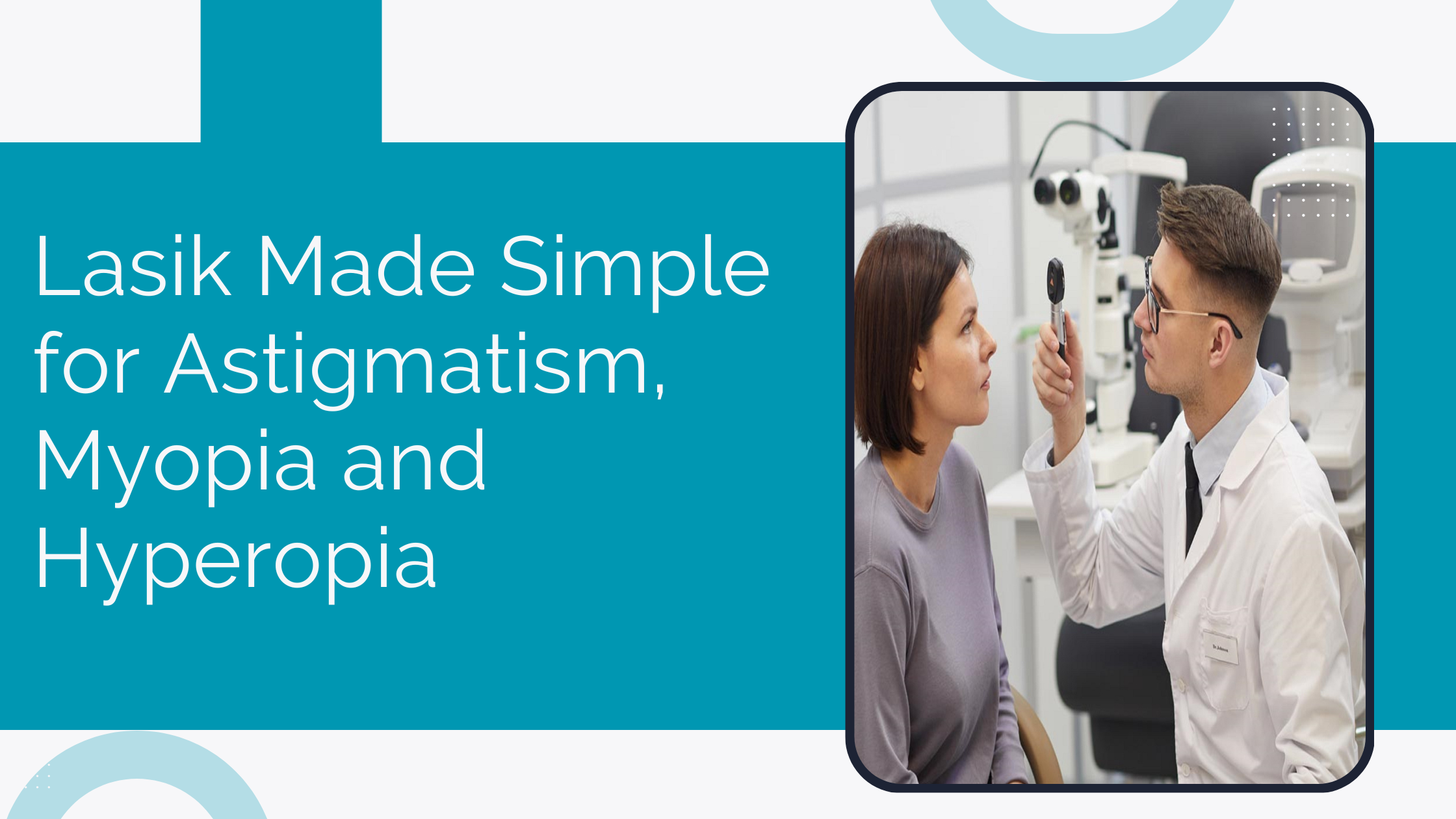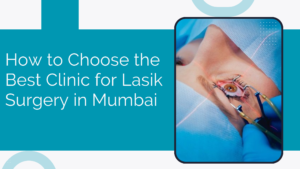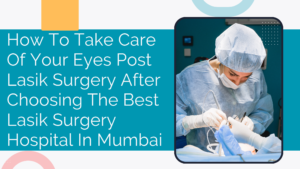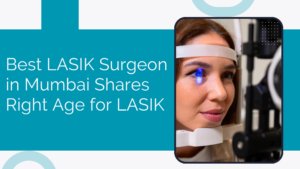Laser vision correction has revolutionized people to achieve clear sight without the help of glasses or contact lenses. Among the most popular and effective solutions is Lasik Surgery in Mumbai, especially for individuals struggling with common refractive errors such as astigmatism, myopia (nearsightedness), and hyperopia (farsightedness). At Clear Vision Eye Centre, under the expert care of Dr. Vinay K Agrawal, patients receive world-class treatment tailored to their specific visual needs. This blog aims to simplify the LASIK process, making it easier to understand how this advanced procedure addresses different kinds of refractive issues.
Understanding Refractive Errors
Before diving into how LASIK works, it is essential to understand the conditions it treats:
- Myopia (Nearsightedness): This condition causes difficulty in seeing distant objects clearly. It occurs when the eyeball is too long or the cornea is too curved, causing light to focus in front of the retina.
- Hyperopia (Farsightedness): In this case, individuals have trouble seeing nearby objects. It results from a shorter eyeball or a flatter cornea, which causes light to focus behind the retina.
- Astigmatism: Astigmatism is caused by an irregularly shaped cornea or lens, leading to blurred or distorted vision at all distances. The eye fails to focus light evenly onto the retina, causing images to appear stretched or skewed.
All three conditions are refractive errors; and LASIK works by reshaping the cornea so that light entering the eye is properly focused onto the retina.
What Is LASIK Surgery?
LASIK (Laser-Assisted In Situ Keratomileusis) is a type of refractive surgery that uses a laser to reshape the cornea, improving the way the eye focuses light. It is a minimally invasive procedure known for its accuracy, safety, and fast recovery time.
The LASIK procedure involves the following steps:
1. Corneal Flap Creation: A thin flap is created on the surface of the cornea using either a microkeratome blade or a femtosecond laser.
2. Reshaping the Cornea: An excimer laser is then used to remove microscopic layers of tissue from the cornea to correct the specific refractive error.
3. Repositioning the Flap: The flap is carefully repositioned and left to heal naturally without stitches.
This quick procedure usually takes less than 30 minutes for both eyes, and patients often notice significant vision improvement within 24 hours.
LASIK for Myopia, Hyperopia, and Astigmatism
Myopia Correction
In cases of myopia, LASIK flattens the cornea slightly so that light rays are refocused directly onto the retina. This correction allows patients to see distant objects clearly, eliminating the dependency on glasses or contact lenses.
Hyperopia Correction
For hyperopia, the laser reshapes the cornea by steepening its center. This helps move the focal point from behind the retina to directly on it, resulting in clearer near vision.
Astigmatism Correction
When treating astigmatism, LASIK smooths out the irregular shape of the cornea. By creating a more symmetrical surface, the light can be focused on the retina, resolving distorted or blurred vision.
Who Is an Ideal Candidate for LASIK?
Not everyone is a perfect candidate for LASIK. A thorough pre-operative evaluation is critical to determine eligibility. Ideal candidates generally:
- Are 18 years or older.
- Have a stable vision for at least one year.
- Do not have any significant eye conditions like keratoconus or severe dry eye.
- Have corneal thickness sufficient for flap creation.
- Are not pregnant or nursing.
Your ophthalmologist will conduct a comprehensive eye exam, including corneal mapping and pupil measurement, to assess whether LASIK is the right choice for you.
About Dr. Vinay K Agrawal
Dr. Vinay K Agrawal (M.B.B.S., M.S. (Ophthalmology), D.N.B. (Ophthalmology), Cornea Fellow, L.V. Prasad Eye Institute) is one of the most commended ophthalmologists in Mumbai for the past 30 years and counting. Over his decades-long ophthalmic practice, he has gained extensive experience in cataract, cornea, and refractive surgery—his areas of specialization. His wealth of knowledge and compassionate approach have made Clear Vision Eye Centre a trusted name in eye care for thousands of satisfied patients.
Benefits of LASIK
The popularity of LASIK stems from its impressive benefits:
- Rapid Recovery: Most patients return to regular activities within a day or two.
- Painless Procedure: LASIK is virtually pain-free thanks to numbing eye drops.
- Immediate Results: Vision improves within hours, with optimal results in a few days.
- Long-lasting Outcomes: Once healed, results are typically permanent.
- Reduced Dependence on Glasses: Many patients achieve 20/20 vision or better.
What to Expect During Recovery
Recovery from LASIK is relatively quick and straightforward. Some common experiences during the healing process for lasik in Mumbai include:
- Mild discomfort or a gritty feeling in the eyes for a few hours.
- Temporary light sensitivity.
- Blurred vision or halos around lights, which usually fade within a week.
Patients are advised to avoid rubbing their eyes, swimming, and strenuous activities for a few weeks. Using prescribed eye drops and attending follow-up appointments ensures smooth healing.
Why Choose Clear Vision Eye Centre?
Clear Vision Eye Centre stands out for its commitment to excellence and personalized care. With state-of-the-art technology, precise diagnostics, and a dedicated team, the centre ensures every patient receives the highest quality treatment. Whether it is your first consultation or your follow-up visit, you can expect transparent communication and expert guidance.
Being under the leadership of the best Lasik surgeon in Mumbai, Dr. Vinay K Agrawal, adds unparalleled credibility and trust to your LASIK journey. His patient-centric philosophy and surgical expertise make the experience both comfortable and successful.
FAQs About LASIK
Q: Is LASIK painful?
A: No, numbing eye drops make the procedure virtually painless.
Q: How long does the procedure take?
A: LASIK typically takes around 15 minutes per eye.
Q: Will I need glasses after LASIK?
A: Most people do not need glasses for daily activities after LASIK; reading glasses may be necessary later in life.
Q: Is LASIK permanent?
A: Yes, the results are generally long-lasting, although natural changes in the eye with age may affect vision over time.
Conclusion
LASIK surgery is a transformative solution for those suffering from astigmatism, myopia, and hyperopia. It provides the freedom to live without constant reliance on corrective lenses. When performed by an experienced specialist like Dr. Vinay K Agrawal, LASIK becomes a safe, effective, and life-enhancing procedure. If you’re exploring options for Lasik Surgery in Mumbai, trust Clear Vision Eye Centre to guide you with professionalism, precision, and care every step of the way. With access to the latest technology, the support of the LASIK Eye Surgery in Mumbai, and an unwavering focus on patient satisfaction, you can be confident in your journey toward a clear vision.




